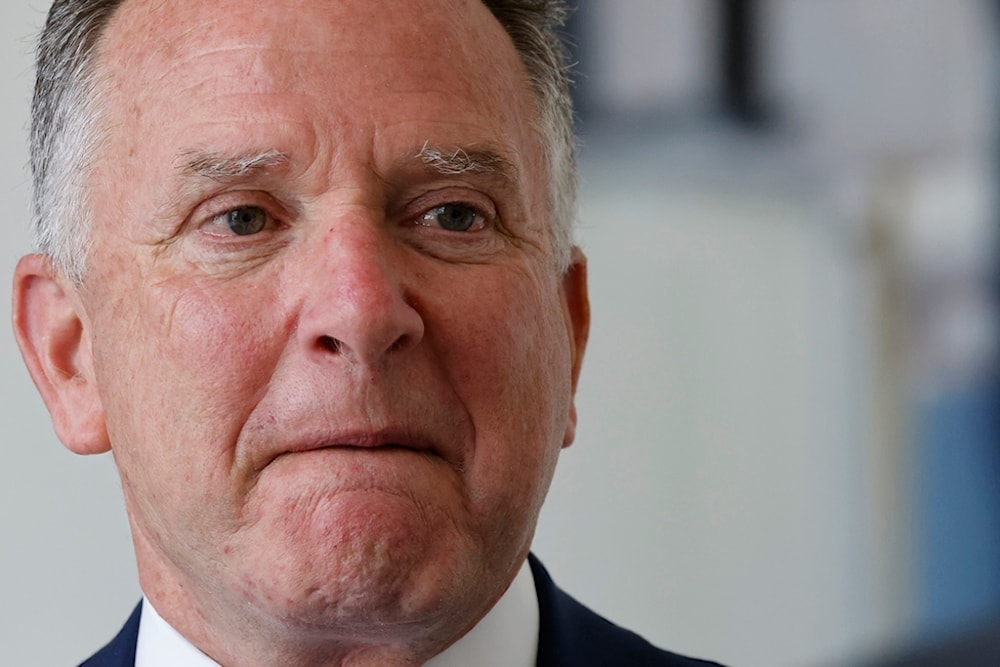Witkoff says Trump wants diplomatic solution to nuclear Iran: Axios
Trump envoy Steve Witkoff reportedly emphasized that the Trump administration's goal is to resolve the Iranian nuclear crisis through diplomatic means.
-

US Special Envoy Steve Witkoff, listening to French President Emmanuel Macron prior to a meeting at the Elysee Palace in Paris, Thursday, April 17, 2025 (AP)
Two senior Israeli officials held a previously undisclosed meeting in Paris on Friday with White House envoy Steve Witkoff, aiming to shape the US position ahead of renewed nuclear talks with Iran, according to Israeli sources cited by Axios.
Strategic Affairs Minister Ron Dermer and Mossad Director David Barnea reportedly traveled quietly to the French capital for the meeting, which comes amid mounting Israeli concerns over a potential US-Iran deal.
Focus on diplomacy, US reassures
During the talks, Witkoff reportedly emphasized that the Trump administration's goal is to resolve the Iranian nuclear crisis through diplomatic means and to ensure that "Iran will no longer enrich uranium", according to the report.
The meeting took place one day before the second round of US-Iran nuclear talks, set for Saturday in Rome. Witkoff had been in Paris for other meetings on Russia and Ukraine before continuing to Italy.
Israelis alarmed by potential deal
Israeli Prime Minister Benjamin Netanyahu remains deeply skeptical of US intentions, fearing an agreement similar to the 2015 Iran nuclear deal signed under President Obama and later abandoned by President Trump.
Netanyahu and other Israeli hardliners are demanding the complete dismantling of Iran’s nuclear program, warning that absent such a guarantee, military action should be considered.
Both the Israeli Prime Minister’s Office and Witkoff’s spokesperson declined to comment on the Paris meeting.
Iran seeks Russian support ahead of talks
On the other side of the negotiations, Iranian Foreign Minister Abbas Araghchi, Witkoff’s counterpart in the talks, arrived in Rome after a visit to Moscow, where he met with Russian President Vladimir Putin. Iran is seeking Moscow’s backing in the talks and hopes Russia will “play a role in a possible deal,” Araghchi said Friday.
While expressing optimism about the seriousness of the US delegation during the first round, Araghchi noted conflicting messages from Washington. “What’s said at the negotiating table is what matters,” he stated, adding that a deal remains possible if the US avoids making "unrealistic demands" — including the full halt of uranium enrichment.
The second round of nuclear talks is scheduled for Saturday at the Omani embassy in Rome, with discussions expected to begin around 5 a.m. ET and last at least five hours. The US side is aiming for the talks to conclude with a clear framework for the next stages of negotiation.
Trump says not rushing military action
US President Donald Trump said Thursday he was not eager to take military action against Iran’s nuclear facilities, emphasizing that diplomacy remains his preferred path, with emerging reports claiming he discouraged an Israeli strike.
In response to a New York Times report claiming he had "waved off" Israeli plans to target Iranian nuclear infrastructure, Trump clarified: "I wouldn’t say ‘waved off.’"
He continued, "I’m not in a rush to do it because I think that Iran has a chance to have a great country. That’s my first option."
Trump also warned of the consequences if diplomacy fails. "If there’s a second option, I think it would be very bad for Iran, and I think Iran wants to talk. I hope they want to talk."
The remarks come amid heightened tensions over Iran’s nuclear program and speculation about potential military scenarios. While the Israeli occupation has signaled its readiness to act independently against perceived "threats" from Tehran, the US president’s comments suggest a desire to avoid escalating the situation into open conflict.

 4 Min Read
4 Min Read










